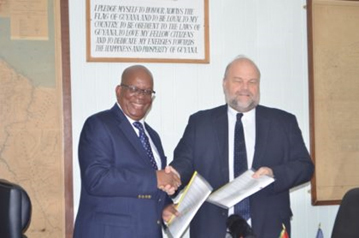Guyana and the United States yesterday signed an agreement for greater cooperation in tackling offshore tax evasion by allowing for reporting on the local holdings of US citizens to the US Internal Revenue Service (IRS).
The implementation of the Foreign Account Tax Compliance Act (FATCA) introduces reporting requirements with respect to certain accounts held by US persons and certain foreign entities in which US persons hold substantial ownership interest, US Ambassador to Guyana Perry Holloway said, following a simple signing ceremony held yesterday at the Ministry of Finance.
“Today’s signing is a significant step in our countries’ efforts to work collaboratively to combat offshore tax evasion, an objective that mutually benefits our two countries,” he noted.

Holloway informed that the signing was just to formalise the framework that had been created.
Noting that the US welcomes Guyana’s commitment to solidifying cooperation to improve international tax compliance, he stressed that access to information is critical to the process and that information sharing is also a top priority for the United States.
According to Holloway, the signing signals a commitment to building a stronger, more stable and accountable global financial system. He said that by “working together to detect, deter and discourage offshore tax evasion, we increase transparency.”
Finance Minister Winston Jordan called the signing “significant and historic” and said it marked the beginning of a new phase of cooperation in tax and anti-money laundering matters.
He explained that FATCA, which was enacted in 2010 by the US Congress, is designed to prevent tax fraud and evasion by US taxpayers using offshore banking facilities. “It creates a new regime of automatic tax information to identify and report information about accounts held by US taxpayers,” he said, while adding that FATCA is part of a global movement towards Automatic Exchange of Information (AEIO) of non-resident financial account data among tax authorities.
According to Jordan, the information exchange has the potential to increase transparency, cooperation and accountability among financial institutions and encourage taxpayers to voluntarily disclose all relevant information to tax authorities.
He said Guyana chose to be involved in “this important venture” not only because it will help to reduce tax evasion in the US but also in Guyana.
To fulfil the potential of FATCA, Jordan informed, Guyana is required to undertake a number of measures to improve and strengthen its own legislative and institutional arrangement, including the passage of an amendment to Section 63 of the Financial Institutions Act to designate the Guyana Revenue Authority (GRA) as the competent Authority on behalf of the Government of Guyana. This, Jordan said, will allow financial institutions to provide the GRA with customer information on reportable accounts. “The sharing of information across countries is important for the enforcement of domestic tax laws. By working together to increase transparency, Guyana and the US will be able to detect and deter abuse of the tax system in both countries. This will enable better accountability within the global financial sector,” he added.
Jordan also said that healthy correspondent banking relationships are essential as they facilitate trade, foster economic growth, create legitimate avenues for growing remittances and providing access to financial services.
He also noted that the implementation of FATCA is only one aspect of Guyana’s recent efforts to strengthen the regulation of its financial sector. This year, he informed, Guyana undertook a national risk assessment in order to allow a more proactive approach to money laundering and terrorist financing, the results of which will allow the country to examine to what extent it is compliant with the recommendations of the inter-governmental Financial Action Task Force (FATF).
Jordan said Guyana is aware of the onerous burden and the great financial and human costs placed upon it to meet the requirements of the organisation’s imposing new regulations. He added that in this regard the country will require technical and other forms of assistance if these regulations are to be implemented in a timely and effective manner.
GRA Commissioner-General Godfrey Statia, who was also present, was asked about efforts to get information on Guyanese with bank accounts in the US. He said that it is a question of asking for the information, while noting that since taking up office, he has asked for information and has been provided with same. “I know prior to me being there… the incorrect procedure [was] being used whereby we were not sending it to the IRS. We were sending it to the institutions which we can’t do…. we need to forward all information that we need to the IRS and they in turn will procure it from the institutions over there,” he said.
Statia said Guyana has been doing its part, which is giving the US the information it has been seeking.




